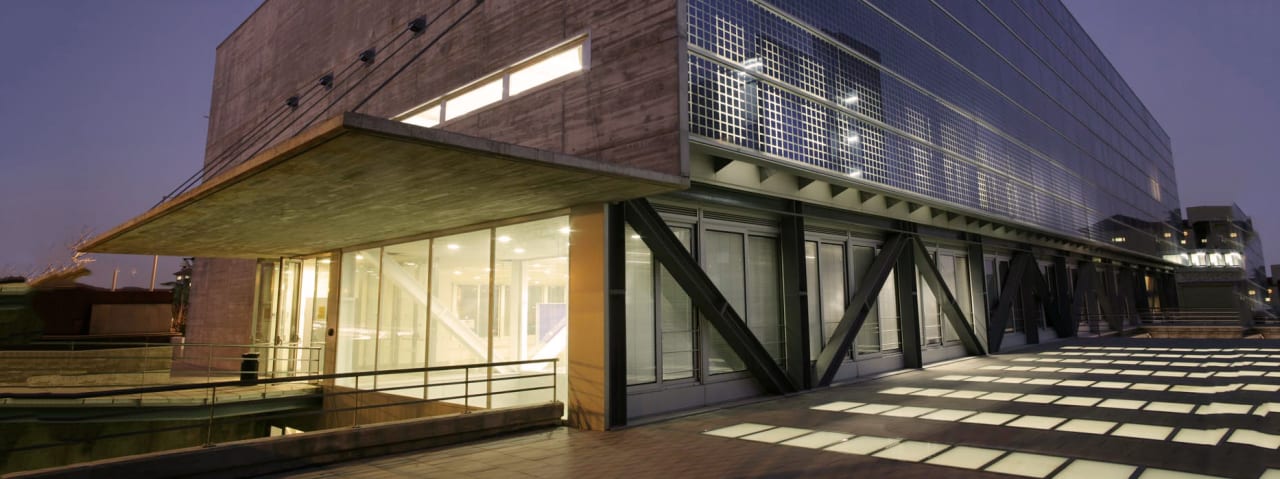
Degree in Audiovisual Engineering (Spanish taught)
La Salle Campus Barcelona – Universidad Ramon Llull

Key Information
Campus location
Barcelona, Spain
Languages
Spanish
Study format
On-Campus
Duration
4 years
Pace
Full time
Tuition fees
Request info
Application deadline
Request info
Earliest start date
02 Sep 2024
Introduction
Degree in Audiovisual Engineering (Spanish taught)
Receive training with a University Degree and become a qualified Engineer in Audio visual Engineering, specialised in Audio and Image
With La Salle’s Undergraduate in Audiovisual Engineering you will be officially qualified to work as a Telecommunications Technical Engineer specializing in Image and Sound and you will achieve a solid grounding in the knowledge you need to take part in a lead projects related to Information and Communication Technology (ICT). You will also receive training as an engineer in the specialties derived from acoustics and image.
- In terms of image, the main areas of knowledge are: video and digital television, design, maintenance and operation of audiovisual installations, research and development of new audiovisual products.
- As for acoustics, you will be trained in environmental acoustics, room acoustics, noise and vibration control, electroacoustics, digital audio, sound recording and speech technologies.
Admissions
Scholarships and Funding
Several scholarship options are available. Please check the university website for more information.
Curriculum
Year 1
Semester 1 / Semester 2
- Introduction to Computers
- Design and Usability I
- Calculus
- Algebra
- Thought and Creativity I
- Programming Methodology and Technology
- Basic Electronics
- Business and Engineering
Year 2
Semester 1 / Semester 2
- Audiovisual Production
- Physics
- Thought and Creativity II
- Digital Systems and Microprocessors
- Signals and Transmission Systems
- Value Chain and Financial Economics
- Analog Electronics
- Fundamentals of Acoustics and Audio
- Statistics and Mathematical Analysis
Semester 1
- Digital Television I
Year 3
Semester 1 / Semester 2
- Audiovisual Language
- Local Area Networks
- 3D Computer Animation
- Thought and Creativity III
- Object Oriented Programming and Design
Semester 1
- Digital Video
- Electromagnetic Propagation
- Digital Signal Processing
- Acoustics Engineering I
Semester 2
- Acoustics Engineering Lab I
- Organizational Management
- Digital Image Processing
- Video Equipment
Year 4
Semester 1
- Room Acoustics
- TV Production
- Active Markets and Services in Telecommunications
- Project Management
- Acoustic Engineering II
- Audio and Speech Processing
- Interconnection of Data Networks
- Internship
Semester 2
- Entrepreneurship and Innovation
- TV Diffusion
- Technological Trends
- Final Thesis
- Acoustics Engineering Lab II
Program Outcome
- Official name: Graduate in Audiovisual Engineering
- Degree certificate issued by The Ministry of Education
- Credits: 240-ECTS
Program outcomes
On completion of the Degree in Audiovisual Engineering:
- You will be able to innovate and develop new technological solutions in the audiovisual field.
- You will acquire management and communication skills.
- You will have leadership and teamwork skills.
- You will develop your entrepreneurial capacity for the creation of new companies.
Program Tuition Fee
Career Opportunities
The specific professional sectors where you can develop your professional career as a graduate in Audiovisual Systems Engineering are:
Audiovisual sector
- Television companies and radio stations
- Video Production Companies
- Content Operators
- Broadcasting audio and video
- Film industry
Acoustic and Audio
- Consulting and acoustics projects
- Architectural, environmental and industrial acoustics
- Acoustic instrumentation
- Automotive and transport industry
- Sound system
- Music Industry
R&D&I Departments
- Image and video processing
- Computer Vision
- Audio and speech processing
- Person-machine interaction
- Information Technology and Services industry
- Streaming video
- Digital television broadcasting
- Audiovisual databases
Program delivery
Instruction languages
The languages of instruction for this program are Catalan, Spanish, and English.
Methodology
The teaching methodology that you will receive by attending the Degree in Audio Visual Engineering is practical and participatory, and is based on the combination of:
- Lectures.
- Problem-solving sessions.
- Teamwork.
- Lab practices.
Smart Learning
With the new Smart Learning model, students will have a training which will be:
- Personalized, because it adapts to the student and their needs or circumstances, regardless of the health scenario.
- Flexible, because it overcomes the barriers of the online or face-to-face methods with a platform that allows face-to-face, blended and distance learning.
- Intelligent, because it is a new way of teaching and learning that combines physical and interactive experiences.
- Technological, in order to implement the Smart Learning methodology, classrooms have been transformed into Smart Classrooms, which consist of:
- Audio system with more than 800 virtual microphones per classroom
- Cameras equipped with artificial intelligence
- Smart Boards to share content to and from the Smart Classroom, enhancing collaborative work.